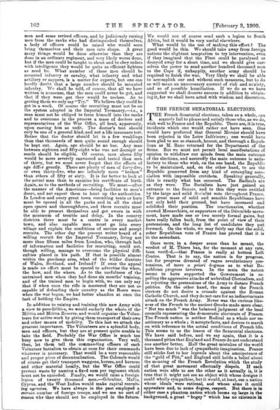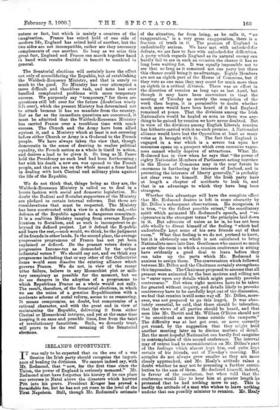THE FRENCH SENATORIAL ELECTIONS. T HE French Senatorial elections, taken as
a whole, can scarcely fail to please and satisfy those who, as we do, wish well to France and the Republic. There are, it is true, incidents which one would rather not have seen. One would have preferred that General Mercier should have been rejected in the Loire Inferieure ; one would have been glad to see so staunch, honest, and thorough a Repub- lican as M. Ranc returned for the Department of the Seine. But we must not permit local manifestations of opinion to withdraw our minds from the main outcome of the elections, and assuredly the main outcome is satis- factory to those who wish, on the one hand, the Republic to be maintained, and, on the other hand, to see the Republic preserved from any kind of entangling asso- cia,tion with impossible crotchets. Speaking generally, this is exactly what has occurred. The Radicals are as they were. The Socialists have just gained an entrance to the Senate, and to this they were entitled by the large and solid Socialist vote throughout France. The great mass of solid and sensible Republicans have not only held their ground, but have increased and solidified their position. The reactionaries, whether avowed Monarchists, or supporters of the Deroulede move- ment, have made one or two merely formal gains, but have really fallen back, from the point of view of their pretensions, and the long list of candidates they put forward. On the whole, we may fairly say that the solid, sober Republican vote of France has proved that it is in the ascendant.
Once more, in a deeper sense than he meant, the verdict of M. Thiers has, for the moment at any rate, been verified,—that France is really at bottom Left Centre. That is to say, the nation is for progress, but for progress divested of vague revolutionary pre- tensions, of mere a priori dogmas as to what Re- publican progress involves. In the main the nation seems to have supported the Government in re- pelling the aggressive attacks of unbridled Clericalism, and in rejecting the pretensions of the Army to dictate French politics. On the other hand, the mass of the French electors do not desire a crusade against the Roman Catholic Church, and they do not care for an indiscriminate attack on the French Army. Never was the curious like- ness of the French to the ancient Greeks made more clear. " Not too much " was the balanced judgment of the local councils representing the democratic electorate of France. The French nation is neither Radical as a whole nor re- actionary as a whole ; it accepts facts, and desires to march on with reference to the actual conditions of French life. This seems to us the lesson of the Senatorial elections. We have said before, and we say again, that it is a thousand pities that England and France do not understand one another better. Half the great mistakes of the world have been due to lack of sympathetic imagination. France still sticks fast to her legends about the omnipotence of the "gold of Pitt," and England still holds a belief about the meaning of the French Revolution which the study of that great movement effectually dispels. If each nation were able to see the other as it actually is, it is true that it might not see an object with whose designs it could wholly sympathise, but it would, at least, see a nation whose ideals were rational, and whose aims it could appreciate and, to some degree, respect. But there is in either case a phantom nation which looms up large in the background, a great " bogey " which has no existence in nature or fact, but which is mainly a creature of the imagination. France has seized hold of one side of modern life, England has seized hold of another, but the two sides are not incompatible, rather are they necessary complements of one another. So long as we seize this great fact, England and France can march together hand in hand with results fruitful in benefit to mankind in general.
The Senatorial elections will certainly have the effect not only of consolidating the Republic, but of establishing the Waldeck-Rousseau Ministry, and that is surely so much to the good. No Ministry has ever attempted a more difficult and thankless task, and none has ever handled complicated problems with more temporary success. We purposely say "temporary," for there are questions still left over for the future (doubtless wisely left over), which the present Ministry has determined not to attack because it has no mandate from the country. But as far as the immediate questions are concerned, it must be admitted that the Waldeck-Rousseau Ministry has carried France over a troublous time with much success. The Church and the Army have been allied against it, and a Ministry which at least is not cowering before either Church or Army is a Godsend to the French people. We have always taken the view that, though democratic in the sense of desiring to realise political equality, the French nation as a whole is timid in action, and desires a lead to be given it. So long as M. Faure held the Presidency no such lead had been forthcoming ; but with his death a new era was opened to the French people, and that era has on the whole meant a freer hand in dealing with both Clerical and military plots against the life of the Republic.
We do not think that, things being as they are, the Waldeck-Rousseau Ministry is called on to deal in a heroic fashion with social and domestic legislation. No doubt the Radical and Socialist supporters of the Ministry are pledged to certain internal reforms. But there are considerations that must be respected. The Ministry has been constructed with a view to a definite end,—the defence of the Republic against a dangerous conspiracy. It is a coalition Ministry ranging from average Repub- licanism to Socialism, and as such is incompetent to go beyond its defined project. Let it defend the Republic and leave the rest,—such would, we think, be the judgment of its friends in other lands. In the second place, the average progressive programme of France has not yet been explained or defined. Do the peasant voters desire a progressive Income-tax as demanded by the urban industrial voters ? We should say not, and we think any programme including that or any other of the Collectivist items would soon dissolve the existing alliance which governs France. We do not, in view of the recent utter failure, believe in any Monarchist plot or mili- tary conspiracy as possible for the moment, but we do see dangers in the adoption of a, programme to which Republican France as a whole would not rally. The result, therefore, of the Senatorial elections, in which we see the union of a genuine Republicanism with a moderate scheme of social reform, seems to us reassuring. It means compromise, no doubt, but compromise of a rational character, and with the great end in view of maintaining the Republic, delivering it from either Clerical or Monarchical intrigue, and yet at the same time keeping it on sane and possible lines, free from the taint of revolutionary fanaticism. Such, we devoutly trust, will prove to be the real meaning of the Senatorial elections.







































 Previous page
Previous page